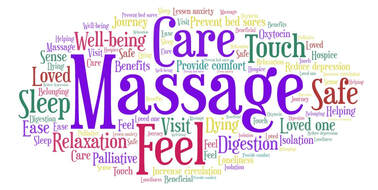|
This blog shouldn’t even need to be written, but here I am reminding us all that touch is the most important sense that the human animal possesses. You might think that that’s craziness, right? I mean, seeing or hearing someone or something committed to doing you harm must be more important, no? What about smelling gas or a burning fire? I could argue that never tasting a perfectly grilled rib steak again would be a tragedy of the highest priority. But touch is the only sense the absence of which can actually kill a person. This issue hit me very hard this week when I saw footage of a man, Scott Dittman, at the Pittsburgh Pride Parade giving out Dad Hugs to the queer community members who had been disowned and/or kicked out of their homes just for being who they are. I saw grown men and women clinging to him, tears streaming down their faces as they grieved the intimacy they’d lost with their own parents. My other impetus for writing on this topic is the fact that there are still children at the U.S./Mexico border being separated from their parents, detained in cages, and dying at a rate of one a month. A teenage mother healing from a caesarian and her preemie were left completely neglected at a border patrol facility for over a week. Touch is the gateway to compassion. Human touch is so important to us that infants deprived of all but the most perfunctory of it will often show signs of aggression, anxiety, and/or depression. What’s worse, babies who are not held and nuzzled and hugged enough will literally stop growing and, if the situation lasts long enough, even if they are receiving proper nutrition, die. There was a time when orphanages’ infant mortality rates were above 30%. In adulthood the children who had been touch-deprived will likely have issues with trust and attachment. They will learn to self-soothe, turning to alcohol or drugs, binge-eating, binge-watching, or binge-Facebooking. There is often an underlying loneliness even inside of a good relationship. (Damn, this has gotten bleak. Time to reel it back in.) There is good news in all of this! First, the damage caused to many of those children can be reversed, and second, we have learned the value of touch for our species. And its value doesn’t diminish over time. We need human contact up until our last breaths and perhaps beyond, when our souls vacate their human bodies. Aaaaand we’re back to dying. Please pay attention, because this really matters. Too many of us forget to touch our dying loved ones for fear that we will hurt them somehow. I’m going to say this loudly, so the people at the back can hear me: You hurt your dying loved one more by not touching them than you do by touching them. Physical touch causes dopamine and serotonin – the body’s antidepressants – to be released by the brain. Further, it suppresses cortisol and, with it, anxiety and stress. Physical touch has tremendous effects on the body’s parasympathetic nervous system. It lowers blood pressure and breathing and heart rates. Gentle massage increases circulation and prevents bed sores. It can reduce the experience of pain. It might be the last form of communication available with a person who is dying, telling the recipient in no uncertain terms that they are loved, that they are safe. And isn’t that ultimately what each of us is looking for? Leave the world better Can you believe I’ve been a massage therapist for twenty-two years? Yes, I was a toddler when I started. 😊 I am so grateful to the clients I have had the great honour to serve, none more so than the ones who were facing end-of-life. Call me if you would like to learn how to best massage a loved one who is in palliative (or memory) care. I will show you how to work around tumour sites, how to roll your loved one to better access their back, and how to massage them in such a way as to not hurt yourself. Up to three people can be included in the training. http://www.violetlight.ca/programs.html AuthorChristie Morden is Calgary's premiere legacy coach. She is dedicated to helping families break the cycle of intergenerational emotional trauma.
1 Comment
|
Christie MordenMental Health Coach Archives
March 2022
|

